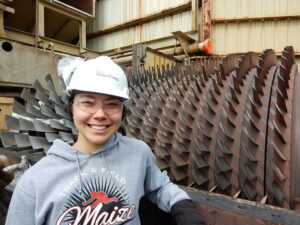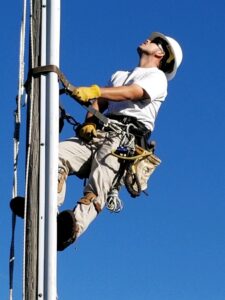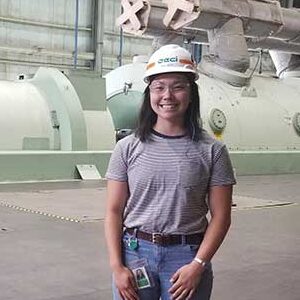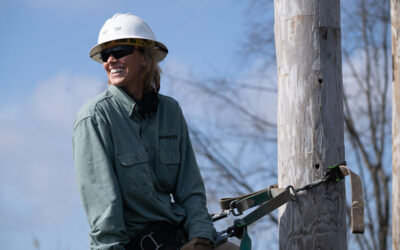Like many college students, Jennifer Poniatowicz had no idea what she wanted to do with her life when she suddenly fell in love.
“I was like a kid in a candy store,” the 25-year-old Virginia Tech graduate remembered.
The object of her affection? The energy industry.
Poniatowicz was a sophomore at the time, a physics major who grew up in South Jersey. “I knew I wanted to stay local when I was home from college in the summer,” she said. “I knew someone at the local gas company and they suggested I apply for an internship.”
It was love at first field trip. “I didn’t know what to expect at first,” she said. “I just wanted to get experience. But I fell in love with the industry.”
It was a whirlwind romance, filled with adventure, she recalled.

Jennifer Poniatowicz
“I used to misunderstand what gas was like, but then I got to see it for real. The drawings and mark-ups for construction, learning where the lines were. I am a very tactile person. There’s only so much you can get from a textbook. I got to see what it takes to maintain a gas line! I kept asking, ‘What’s this? What’s this? What’s this?’ My mentor and manager were all too happy to help me out and explain things.”
Poniatowicz, now a specialist for operations and engineering services for the American Gas Association, said she was given hands-on experiences working directly on meaningful projects – not stuck in a corner somewhere with busy work. And, she got paid for her work. “Good pay,” she said. “Better than working in a restaurant or retail.”
Like energy jobs, energy internships offer competitive pay, along with an inside track to careers in the industry. Companies often hire straight out of their internship programs and offer students an opportunity to explore a variety of jobs, learning a wide range of skills – from how to design gas lines to how to restore power in an outage.
“Internships are test runs for full-time jobs,” said Mia Magby, who held three different internships while earning her degree in engineering management and economics at Missouri University of Science and Technology.

Mia Magby
Magby learned about the energy industry the old-fashioned way – she grew up hearing about it from her dad and visiting job sites with him, where she watched him build and take apart heavy equipment.
“This was the only thing I found interesting,” she said. But she wasn’t sure how to incorporate her other love – being around people.
“The biggest thing for me, at all of my internships, was figuring out what kind of job I was looking for and what kind of company I wanted to work for,” she said.
Her first internship was at a coal-fired power plant in Missouri, and the second was at a manufacturing company in Iowa. The third took place virtually because of the pandemic. She spent the summer handling data analysis for the natural gas side of Dominion Energy, which led to a full-time job offer last fall. While she won’t start the job until next fall, Magby enjoyed being able to finish her degree knowing her future was secure.
“I was chilling out at school not having to worry about it, just worrying about the academics part,” she said.
Erik Jauregui remembers when he, too, was bitten by the energy bug. It was his senior year of high school. Representatives from OPPD’s Legacy Program came into the lunchroom to speak with students, enticing them with stories of working with their hands outdoors, climbing utility poles and turning the power back on.

Erik Jauregui
“I thought I’d try it out,” said Jauregui, who now works as a lineworker for OPPD. “It was a different job you don’t really hear about. If it wasn’t for Legacy, I wouldn’t even know what a lineworker was. But that internship solidified that this was what I wanted to be. I got hooked.”
After his internship, Jauregui entered a lineworker training “boot camp” at his local community college, becoming a contractor in 2019. After a year and a half of experience on the line, he was hired full-time at OPPD in 2020. “The internship gave me a path toward my career, doing something that I’m happy doing, that I love doing,” he said.
It helped him reach other goals, as well. Though just 21, Jauregui was able to save enough money to buy his own home. “My next goal would be to complete a four-year apprenticeship, get more knowledge and become a supervisor or manager,” he said.
Magby said energy jobs don’t just pay well, they offer flexibility and stability.
“Dominion is pretty broad, in terms of opportunities,” she said. “I’m very excited to try the natural gas side of the industry because that’s what my internship was in, but power generation is what I grew up around and I’d like to get back to that at some point, after I try some different areas first.”
“The energy industry is one of the most stable industries you can get into now,” she said. “There’s a lot of job security.”
Poniatowicz couldn’t agree more. “The energy industry has so much stability,” she said. “Everyone needs energy in some shape or form, to power their buildings, to light the stove to make lunch. Knowing it’s always in demand and you’re always directly helping the customer – knowing that what you’re doing is making a big difference – that’s exciting.”




